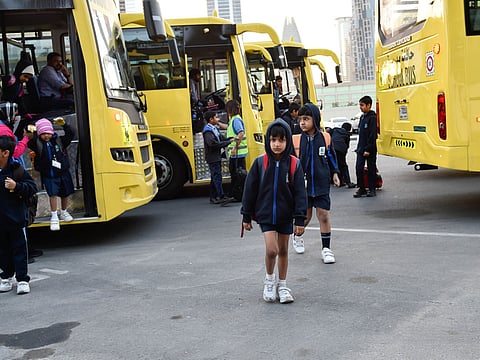Parents react to announcement that UAE schools likely to reopen in September
COVID-19 impact: Some call for option to homeschool with fee reductions, reduced workload

Abu Dhabi: After nearly three months of distance learning, parents across the UAE appear to be concerned about the possibility of sending their children back to school once the summer break ends.
Many have urged that families be given the choice to continue homeschooling their children, citing concerns about children’s ability to maintain social distancing amid the coronavirus outbreak. However, they did specify that distance-learning models should be supported by adequate fee adjustments and reduced workloads.
During a meeting between the UAE Ministry of Education with the UAE Education and Human Resources Council on Saturday, officials discussed the possibility of educational institutions reopening in September. Hussain Al Hammadi, Minister of Education, alluded to the possibility of resuming regular schooling, with the added adoption of precautionary measures against COVID-19.
“We will not send our children if the current [COVID-19] situation continues, even with masks on. It is not reasonable that we do not meet our family at home, but send children to mix with others at school,” a concerned Emirati mother told Gulf News.
Parents with younger children worried
“It’s simply not safe to send children to school yet, and parents should have an option to decide how they want to continue with their children’s schooling. My husband and I have even considered keeping our four-year-old daughter home for a year,” said Nadia Afreen, 39, a Bangladeshi network operations executive. Her daughter is enrolled in KG1 at a British curriculum school.
Her concerns were echoed by other parents, who said they had actively considered giving children a gap year. Parents with younger children were especially worried about the resumption of regular schooling.
“My son had five different viral infections in just the first two terms of school, and not a single one since distance learning began. He is very prone to contracting infections, and with COVID-19 being an infection, I am not at all comfortable sending him back to school,” another mother of a five-year-old boy added.
Some families say they are actively considering keeping their children at home for a year until the outbreak subsides, but they admit that this has its own problems.
“My daughter has started learning addition and subtraction. I cannot possibly continue teaching her other more complex concepts after I return to work full-time. But if I keep her home, she might forget these concepts. It’s a very difficult decision,” Afreen added.
How will schools open?
In general, parents said they had very little clarity about how schools plan to reopen. Would the new term mean children go in on specific days? Would there be as many children in each class, and how would social distancing be ensured?
Some schools have suggested that children may come in on specific days of the week only, or that children will be assigned to specific groups and asked to attend at designated times.
Repeated call for fee reductions
“Either way, fees need to be reduced if we have to dedicate huge chunks of our time teaching children, as well as spending hefty amounts on child care while we are at work,” the working mother said.
The call for lower fees was repeated by many families, who said that the current fee structure across various curricula is unsustainable, especially in light of salary reductions and job losses.
Hopeful about the future
In the meantime, parents are continuing to be hopeful that the outbreak will subside by September.
“My three-year-old daughter is due to go to school for the first time in September. I hope that schools will function normally by then, as I would prefer to send her to a regular school. Of course, I am also hoping that the outbreak will have disappeared by then,” said Queen Marivic, 35, a nurse from the Philippines.
Heavy distance-learning workload
Tanveer Ahmed, 42, a senior administrative professional from India, said the distance-learning workload had proved to be far too heavy for his three daughters.
“My daughters spend six to seven hours a day simply glued to their schoolwork, with no room for social interaction or a break. Schoolwork just takes far too long and they are constantly stressed out. I would rather have them go back to school, of course under the guidance of the education and health authorities,” Ahmed said.









